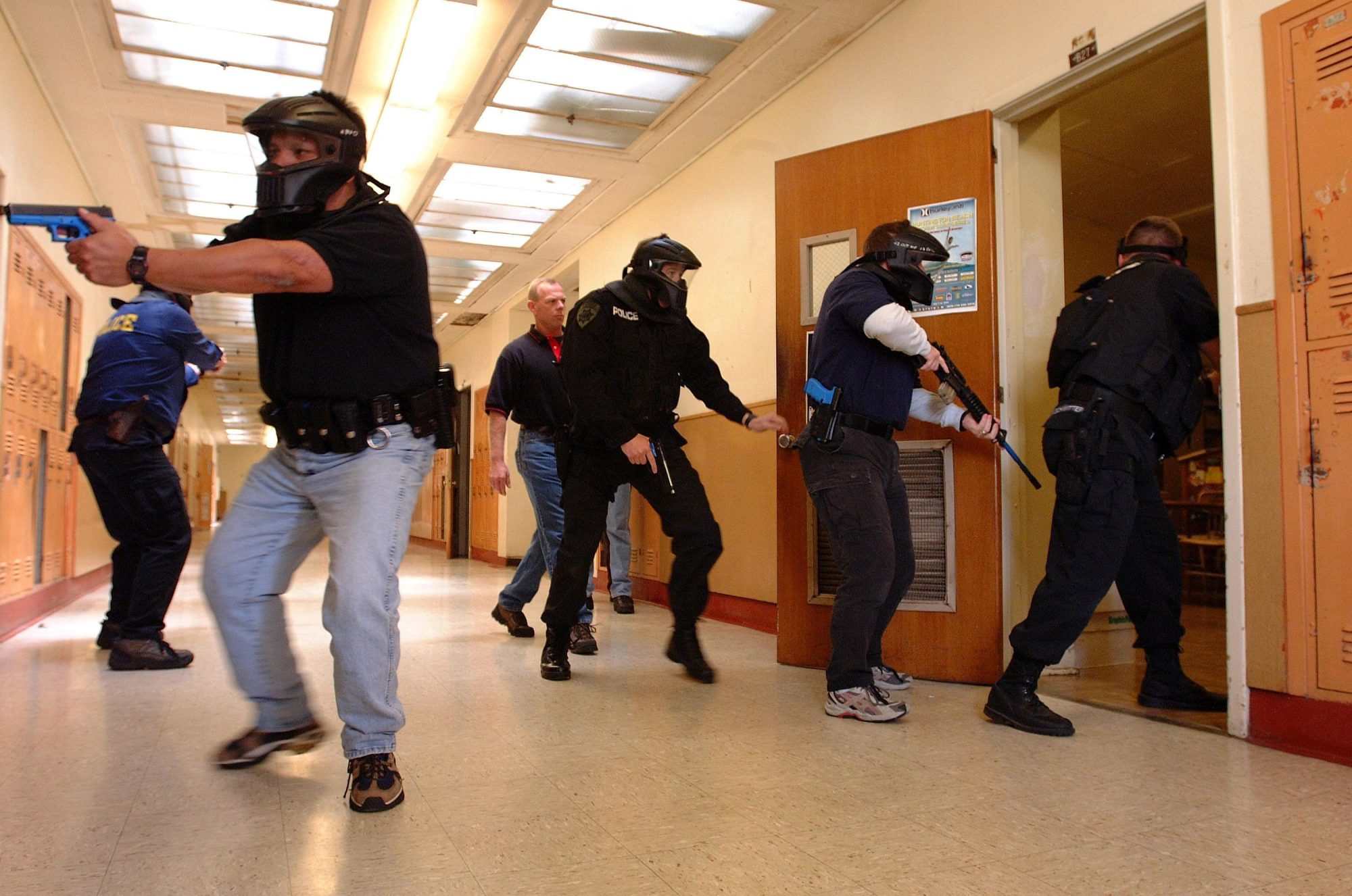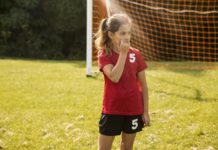A horrifying TikTok "challenge" added more fuel to the fiery conversation around school shootings and active shooter drills. Last month, students, teachers, and parents were dealing with the downstream effect of a TikTok school shooting challenge that dared kids to call in shooting or bombing threats on December 17.
The prevalence of school shootings has led to active shooter drills, which, according to the American Academy of Pediatrics (AAP), are creating stress on their own. Case in point: On December 16, a Redditor shared a heartbreaking post in which they explained that their first grader had an active shooter drill in school and came home "quite scared."
"She asked if the bad guy is in the same room as her, but she doesn't have energy to run away fast enough, what should she do?" wrote the original poster (OP). "I don't know what to tell her."
The Redditor explained that they live in Connecticut, and the recent, deadly Oxford shooting in Michigan, brought back memories of the Newtown massacre. "It feels especially raw this year because my child is now the same age as the little kids who were murdered," noted the OP. "I keep imagining her facing a shooter and just being overcome with terror. I had not talked about mass shootings with her before, but now that she had the drill at school, I feel like I should talk to her about it, I just don't know what to say."
The OP added a P.S. that their daughter's school had just "sent out a text about vague but still terrifying threats on TikTok about school shootings tomorrow."
Commenters were quick to commiserate with the parent. r/kitkate2222, who identified themselves as a Connecticut teacher, wrote that "running these drills absolutely sucks. I hate that this is the world we live in."
They continued, "Your instincts are spot on. You should definitely talk to your child about them. There's this guide from Common Sense Media on thinking through how to talk to your child about school shootings. I also highly recommend reaching out to your child's teacher and school counseling staff for advice on what to tell them. They can help you understand what is communicated to the children and help keep an eye on her at school."

How Pros Recommend Parents Talk to Kids About Active Shooter Drills
If you've found yourself in the OP's shoes, consider these expert tips for discussing active shooter drills and school shootings.
Ask them what they know.
Nicole Christian-Brathwaite, M.D., a nationally recognized, board-certified adult, child, and adolescent psychiatrist and Chief Medical Officer of AtHome and Scheduled Care at Array Behavioral Care, says it's important to identify where kids are getting their info about active shooter drills or shootings. Is it from social media, TV, their peers? "This information may be factual, but much of it may also be misleading or incorrect," she notes.
She advises asking them:
Consider your child’s unique thoughts and feelings.
"Kids of all ages, but especially elementary school kids want to know three basic questions: Am I safe? Are the people caring for me safe? How will this affect my daily life?" says Gene Beresin, M.D., psychiatrist and executive director of the Clay Center for Young Healthy Minds at Massachusetts General Hospital in Boston.
Still, don't assume you know what's running through their heads. "You can only provide reassurance if you know what they are worried about," says Dr. Beresin. "The key is to listen to them and validate their feelings. This way, they know you are paying attention to their concerns."
To that end, Dr. Christian-Brathwaite recommends practicing reflective listening.
"This means not listening to respond but listening to understand or comprehend," she notes. "After your child offers an explanation, or answers a question, summarize what you've heard before responding to their statement i.e. 'Oh wow, so it sounds like you are saying your friends have been talking about this in school and it upsets you.'"
And in addition to summarizing what your child said, it's helpful to add an emotional descriptor, says Dr. Christian-Brathwaite. "This supports your child's emotional vocabulary, but also assists you in better understanding what they are feeling," she explains. "If you misunderstood what your child was communicating, reflective listening provides your child with the opportunity to clarify or correct."
Clarify what their specific fears are and address each of those first.
"Even if their fears seem overblown or exaggerated to you, they are valid to your child," says Dr. Christian-Brathwaite. The perception of your child is what matters most."
To validate and affirm their emotions, you can say, "I can understand why that experience would be very scary" or "it's OK to feel frustrated."
Remind them what a drill is.
"Shooter drills are very frightening to many kids, because they may interpret this as preparation for something that is about to happen in their school," says Dr. Beresin. "They need to know that all drills, all practices are done, not because something is about to happen, but as a way of practicing for things that are rare."
To that end, Niro Feliciano, LCSW, a Connecticut-based psychotherapist, anxiety specialist, and author of the forthcoming title This Book Won't Make You Happy, notes, "We have to explain to them, statistically, the chances of mass shootings happening at their school are small, but we like to be prepared for the situation—just like we do fire drills."
Continuing to draw a parallel to fire drills can be helpful, according to Dr. Beresin, who recommends asking your child if they've heard of or experienced a fire happening in their school. "Most elementary kids would say no," he notes. "Then, say, 'So we have fire drills, only in case something incredibly rare happens. This is the same for active shooter drills. It is extremely rare, no matter what you hear in the news, and it's the same kind of thing as a fire drill.'"
Strive to adopt a calm tone.
He also points out that the calmer and more contained you are when talking about active shooter drills and mass shootings, the less anxious kids will be. "Remember that anxiety is contagious, and your young kids will pick up on your anxiety," says Dr. Beresin.
Similarly, you'll want to show your child healthy ways to address anxiety, says Dr. Christian-Brathwaite. "Admit you may also feel anxiety and model how you are managing that anxiety, whether through exercise, mindfulness, yoga, deep breathing, therapy, talking about it, writing about your feelings, deep breathing, etc.," she advises.
A regular mindfulness practice can benefit you and your child, as it can build resilience in children, says Dr. Christian-Brathwaite, providing them with effective coping skills that can help them manage stress in the future.
Offer your child an out.
Dr. Christian-Brathwaite advises paying attention to see if your child is becoming antsy or agitated. If so, ask them if they want to take a break, get a snack, or return to the conversation at a later specified date and time, she advises.
Talk to your child’s school about taking a trauma-informed approach with active shooter drills.
"Taking a trauma-informed perspective means supporting and addressing the whole child," says Dr. Christian-Brathwaite.
This conversation could involve touching on the AAP's recommendation that, in most situations, active shooter drills should be conducted like fire drills, which don't simulate an actual fire and which use a calm approach to the safe movement of students and staff in the school building.
The Bottom Line
"As a parent, you know your child best and know what information is helpful for them to know versus what may lead to increased anxiety," notes Dr. Christian-Brathwaite. While you can acknowledge that terrible things can happen, she advises, you can quickly pivot to explaining in detail what is being done to keep your child and their classmates safe.





